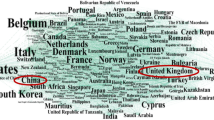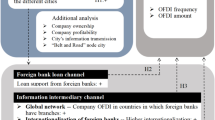Abstract
Turkey has been deeply integrated with the EU, its largest trading partner, particularly following the Customs Union agreement in 1996. However, the free trade agreements (FTAs) signed by the EU with third party countries may create some unfair competitive pressures, market share and welfare losses for Turkey. This study investigates the impact of the FTA signed by Algeria and the EU in 2005 on Turkey’s trade flows. Covering 181 countries, a difference-in-differences analysis embedded in an extended gravity framework is employed to quantify the trade effects of the EU-Algeria FTA for the period of 1996–2013. Our findings suggest that bilateral trade between Turkey and Algeria is affected adversely due to the FTA. The counterfactual analysis shows that Turkish exports and imports to/from Algeria could have been 12 and 17% higher, respectively, had there been no FTA between the EU and Algeria.

Source: EUROSTAT

Source: IMF-DOTS

Source: TURKSTAT


Similar content being viewed by others
Notes
See Yalcin et al. (2016) for a detailed discussion of the potential impact of TTIP on Turkey.
The legal basis of the customs union of Turkey with the EU committing both parties to the common external tariffs is defined under Decision No. 1/95 Of The EC-Turkey Association Council of 22 December 1995.
The Customs Union Agreement covers all industrial goods but does not include agriculture (except processed agricultural products), services or public procurement.
In 2006, “Friendship and Cooperation Agreement” was signed between Turkey and Algeria to serve as a foundation in bilateral relations. Turkey invited Algeria to engage in FTA negotiations. However, “The Report Algeria 2010” provides an interview with Turkish Minister of Economics and he suggests that Algeria awaits the completion of WTO membership process to start the negotiations with Turkey.
Ulrika Lomas, Algeria Delays Implementation of FTA with EU, TaxNews, Sept. 4, 2012, http://www.bilaterals.org/?algeria-delays-implementation-of#sthash.0zUcmgKh.dpuf (Algerian trade minister Mustapha Benbada points out that “the existing association agreement with the EU cost Algeria USD 2.5 m in lost customs duties between 2005 and 2009, while investments from the EU have not been as strong as initially anticipated. At the same time, Algerian imports from the EU have increased dramatically”).
See Yalcin et al. (2016) for a broad discussion of the total effect (dect and indirect) of the potential third country FTAs of the EU on Turkish trade and welfare. Their results indicate that if there were FTAs between Turkey and the EU’s six new potential trade partners would result in a 2.13% and 200 USD rise in welfare and GDP per capita in Turkey, respectively.
The CEPII database can be accessed at www.cepii.fr/anglaisgraph/bdd/distances.htm.
References
Abedini J, Peridy N (2008) The Greater Arab Free Trade Area (GAFTA): an estimation of the trade effects. J Econ Integr 23(4):848–872
Abrams RK (1980) International trade flows under flexible exchange rates. Econ Rev 65(3):3–10
Adam A, Moutos T (2008) The trade effects of the EU-Turkey customs union. World Econ 31(5):685–700
Aitken ND (1973) The effect of the EEC and EFTA on European trade: a temporal cross-section analysis. Am Econ Rev 63(5):881–892
Anderson JE (1979) A theoretical foundation of the gravity model. Am Econ Rev 69(1):106–116
Anderson JE, Van Wincoop E (2003) Gravity with gravitas: a solution to the border puzzle. Am Econ Rev 93(1):170–192
Antonucci D, Manzocchi S (2006) Does Turkey have a special trade relation with the EU? A gravity model approach. Econ Syst 30(2):157–169
Baier SL, Bergstrand JH (2002). On the endogeneity of international trade flows and free trade agreements. Manuscript. http://www.nd.edu/~jbergstr/Working_Papers/EndogeneityAug2002.pdf
Baier SL, Bergstrand JH (2004) Economic determinants of free trade agreements. J Int Econ 64(1):29–63
Baier SL, Bergstrand JH (2007) Do free trade agreements actually increase members’ international trade? J Int Econ 71(1):72–95
Baier SL, Bergstrand JH (2009) Bonus vetus OLS: a simple method for approximating international trade-cost effects using the gravity equation. J Int Econ 77(1):77–85
Bergstrand JH (1985) The gravity equation in international trade: some microeconomic foundations and empirical evidence. Rev Econ Stat 67(3):474–481
Bergstrand JH (1989) The generalized gravity equation, monopolistic competition, and the factor-proportions theory in international trade. Rev Econ Stat 71:143–153
Brada JC, Méndez JA (1985) Economic integration among developed, developing and centrally planned economies: a comparative analysis. Rev Econ Stat 67:549–556
Carrere C (2006) Revisiting the effects of regional trade agreements on trade flows with proper specification of the gravity model. Eur Econ Rev 50(2):223–247
Deardorff A (1998) Determinants of bilateral trade: does gravity work in a classical world? In: Frankel J (ed) The regionalization of the world economy. University of Chicago Press, Chicago
Egger H, Egger P, Greenaway D (2008) The trade structure effects of endogenous regional trade agreements. J Int Econ 74(2):278–298
Evenett SW, Keller W (2002) On theories explaining the success of the gravity equation. J Polit Econ 110(2):281–312
Frankel JA, Stein E, Wei SJ (1995) Trading blocs and the americas: the natural, the unnatural, and the super-natural. J Dev Econ 47(1):61–95
Lejour AM, de Mooij RA (2005) Turkish delight: does Turkey’s accession to the EU bring economic benefits? Kyklos 58(1):87–120
Magee CS (2003) Endogenous preferential trade agreements: an empirical analysis. Contrib Econ Anal Policy 2(1)
Magee CS (2008) New measures of trade creation and trade diversion. J Int Econ 75(2):349–362
Neyaptı B, Taskın F, Üngör M (2007) Has European customs union agreement really affected Turkey’s trade? Appl Econ 39(16):2121–2132
Nowak-Lehmann F, Herzer D, Martinez-Zarzoso I, Vollmer S (2007) The impact of a customs union between Turkey and the EU on Turkey’s exports to the EU. J Common Mark Stud 45(3):719–743
Santos Silva JMC, Tenreyro S (2006) The log of gravity. Rev Econ Stat 88(4):641–658
Togan S (2000) Effects of a Turkey-European Union customs union and prospects for the future. Russ East Eur Financ Trade 36(4):5–25
World Bank (2014) “Evaluation of the EU-Turkey Customs Union”, No. 85830-TR, http://www.worldbank.org/content/dam/Worldbank/document/eca/turkey/tr-eu-customs-union-eng.pdf
Yalcin E, Aichele R, Felbermayr G (2016) Turkey’s EU integration at a crossroads, Global economic dynamics study. Bertelsmann Stiftung, Gütersloh
Zidi A, Dhifallah SM (2013) Trade creation and trade diversion between Tunisia and EU: analysis by gravity model. Int J Econ Financ 5(5):131–147
Author information
Authors and Affiliations
Corresponding author
Additional information
We wish to thank seminar participants in ERF Conference 2016 in Cairo and MEEA Conference 2016 in San Francisco for useful comments. The usual disclaimer applies.
The findings and conclusions in this paper are those of the authors and do not represent the views of the World Bank.
Rights and permissions
About this article
Cite this article
Dincer, N.N., Tekin-Koru, A. & Yaşar, P. Costs of a missing FTA: the case of Turkey and Algeria. Empirica 45, 489–505 (2018). https://doi.org/10.1007/s10663-017-9369-3
Published:
Issue Date:
DOI: https://doi.org/10.1007/s10663-017-9369-3




